MKT600 - Sustainable Marketing: Practices and Benefits Report
VerifiedAdded on 2023/02/01
|12
|1026
|63
Report
AI Summary
This report provides a comprehensive overview of sustainable marketing, exploring its crucial role in modern business. It delves into the ethical issues that arise in marketing practices, highlighting the need for companies to prioritize social and environmental welfare. The report examines various aspects of sustainable marketing, including its benefits such as environment conservation and improved public relations. It also discusses socially and environmentally responsible marketing strategies, emphasizing the importance of transparency, accurate product labeling, and the adoption of green marketing practices. The report further explores the use of online marketing to reduce environmental impact and the need for genuine sustainability efforts to avoid greenwashing. It includes graphs and references to support the analysis, offering valuable insights into the evolving landscape of ethical and sustainable marketing.
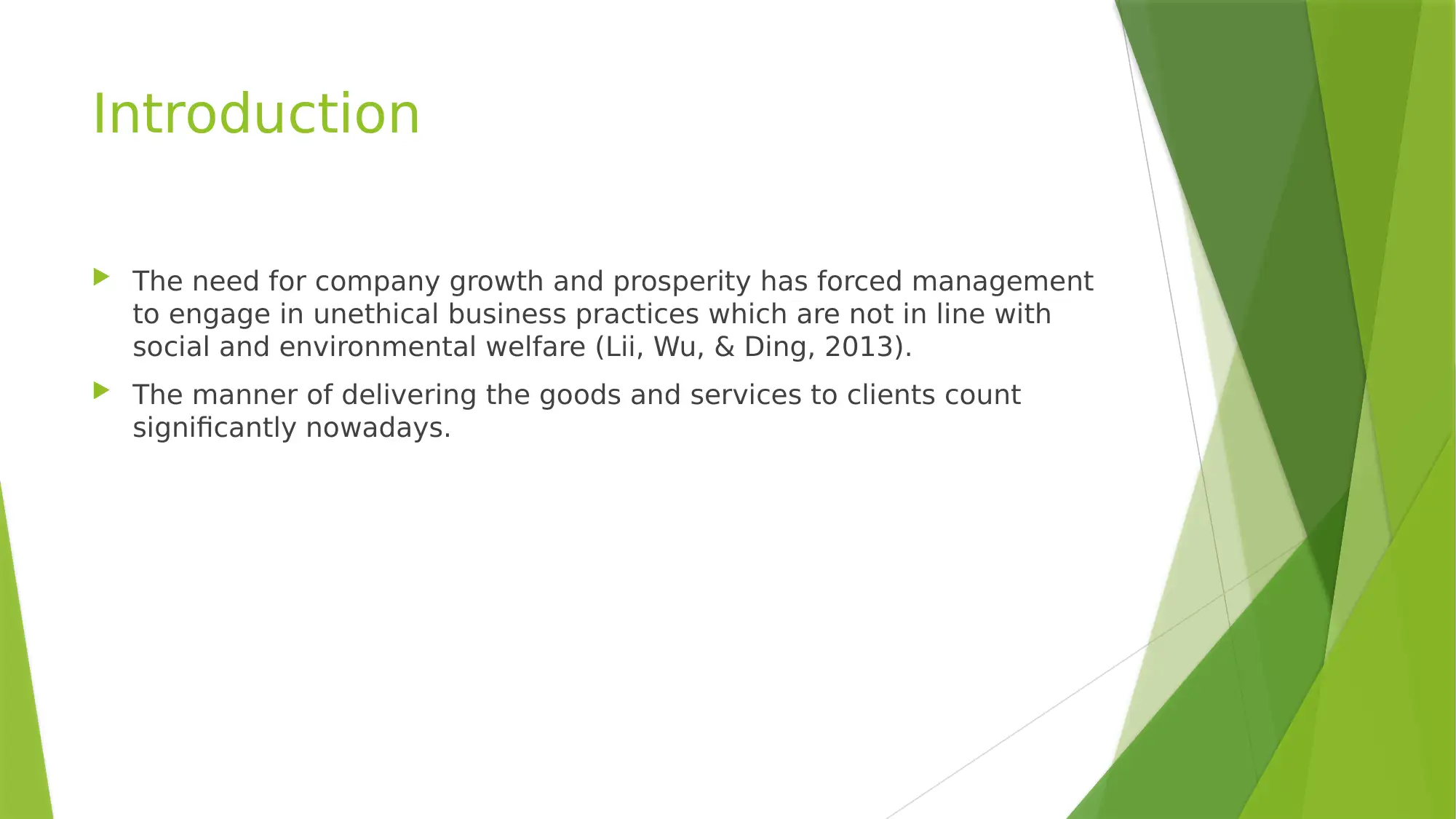
Introduction
The need for company growth and prosperity has forced management
to engage in unethical business practices which are not in line with
social and environmental welfare (Lii, Wu, & Ding, 2013).
The manner of delivering the goods and services to clients count
significantly nowadays.
The need for company growth and prosperity has forced management
to engage in unethical business practices which are not in line with
social and environmental welfare (Lii, Wu, & Ding, 2013).
The manner of delivering the goods and services to clients count
significantly nowadays.
Paraphrase This Document
Need a fresh take? Get an instant paraphrase of this document with our AI Paraphraser
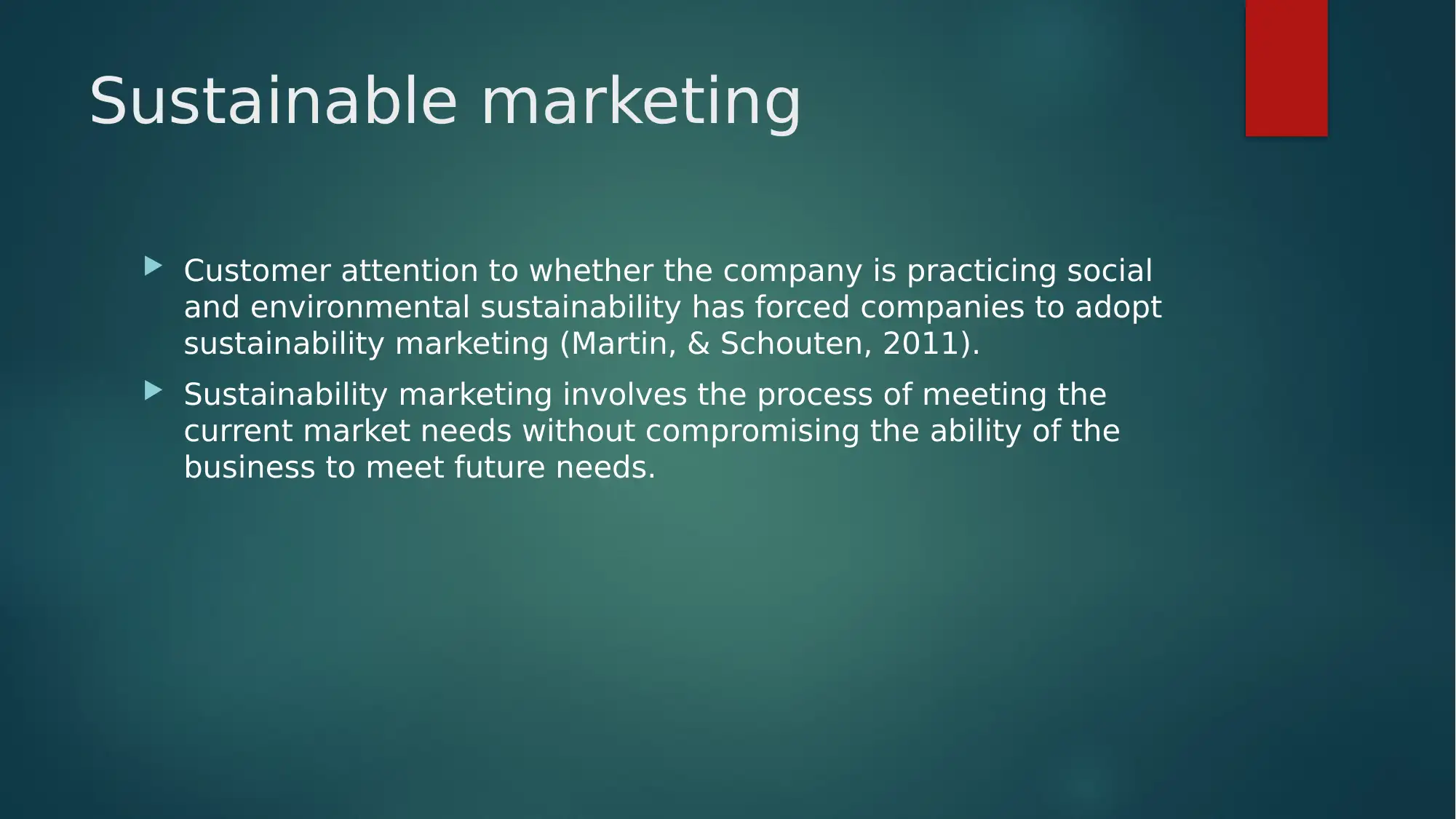
Sustainable marketing
Customer attention to whether the company is practicing social
and environmental sustainability has forced companies to adopt
sustainability marketing (Martin, & Schouten, 2011).
Sustainability marketing involves the process of meeting the
current market needs without compromising the ability of the
business to meet future needs.
Customer attention to whether the company is practicing social
and environmental sustainability has forced companies to adopt
sustainability marketing (Martin, & Schouten, 2011).
Sustainability marketing involves the process of meeting the
current market needs without compromising the ability of the
business to meet future needs.
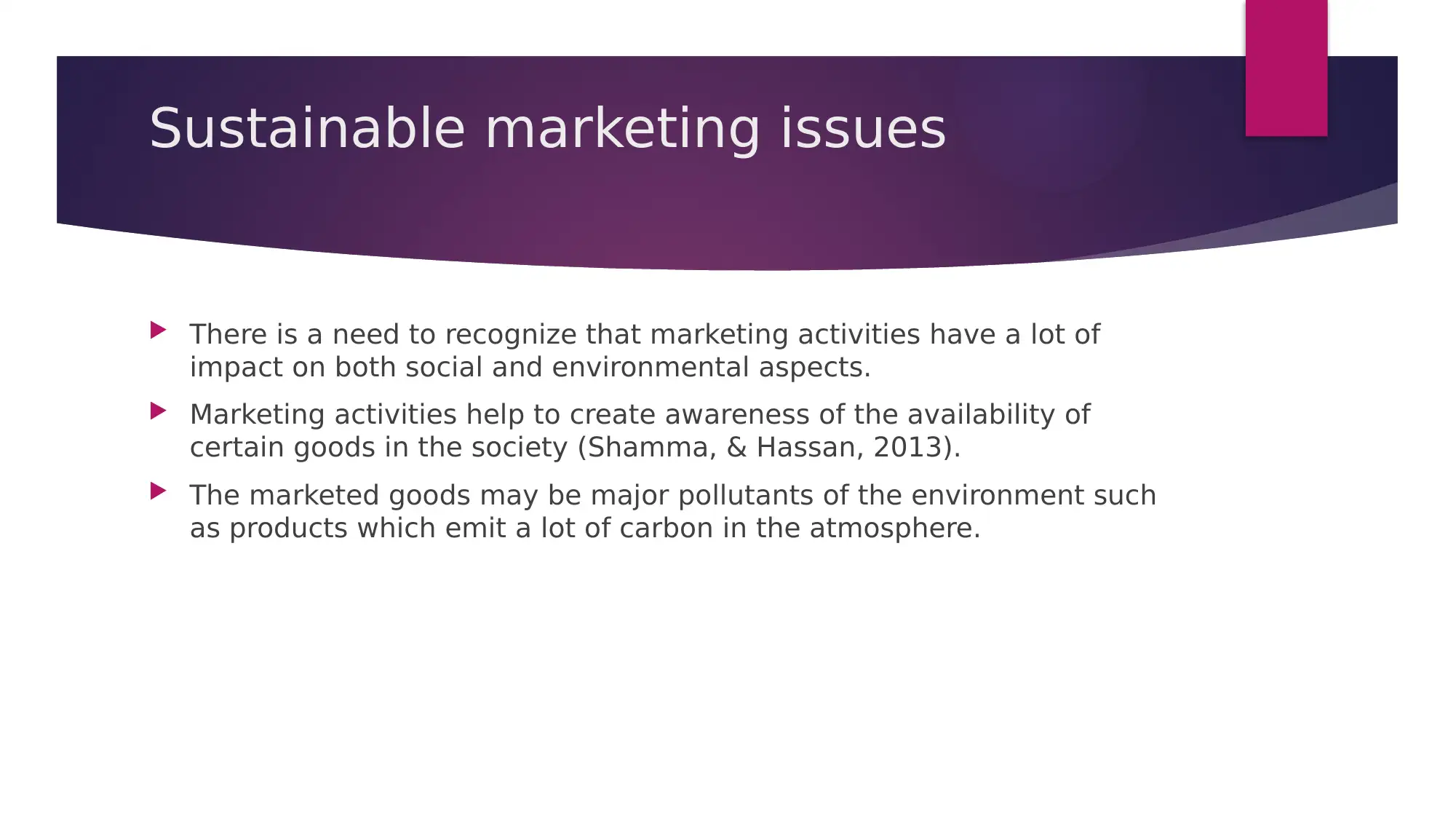
Sustainable marketing issues
There is a need to recognize that marketing activities have a lot of
impact on both social and environmental aspects.
Marketing activities help to create awareness of the availability of
certain goods in the society (Shamma, & Hassan, 2013).
The marketed goods may be major pollutants of the environment such
as products which emit a lot of carbon in the atmosphere.
There is a need to recognize that marketing activities have a lot of
impact on both social and environmental aspects.
Marketing activities help to create awareness of the availability of
certain goods in the society (Shamma, & Hassan, 2013).
The marketed goods may be major pollutants of the environment such
as products which emit a lot of carbon in the atmosphere.
⊘ This is a preview!⊘
Do you want full access?
Subscribe today to unlock all pages.

Trusted by 1+ million students worldwide
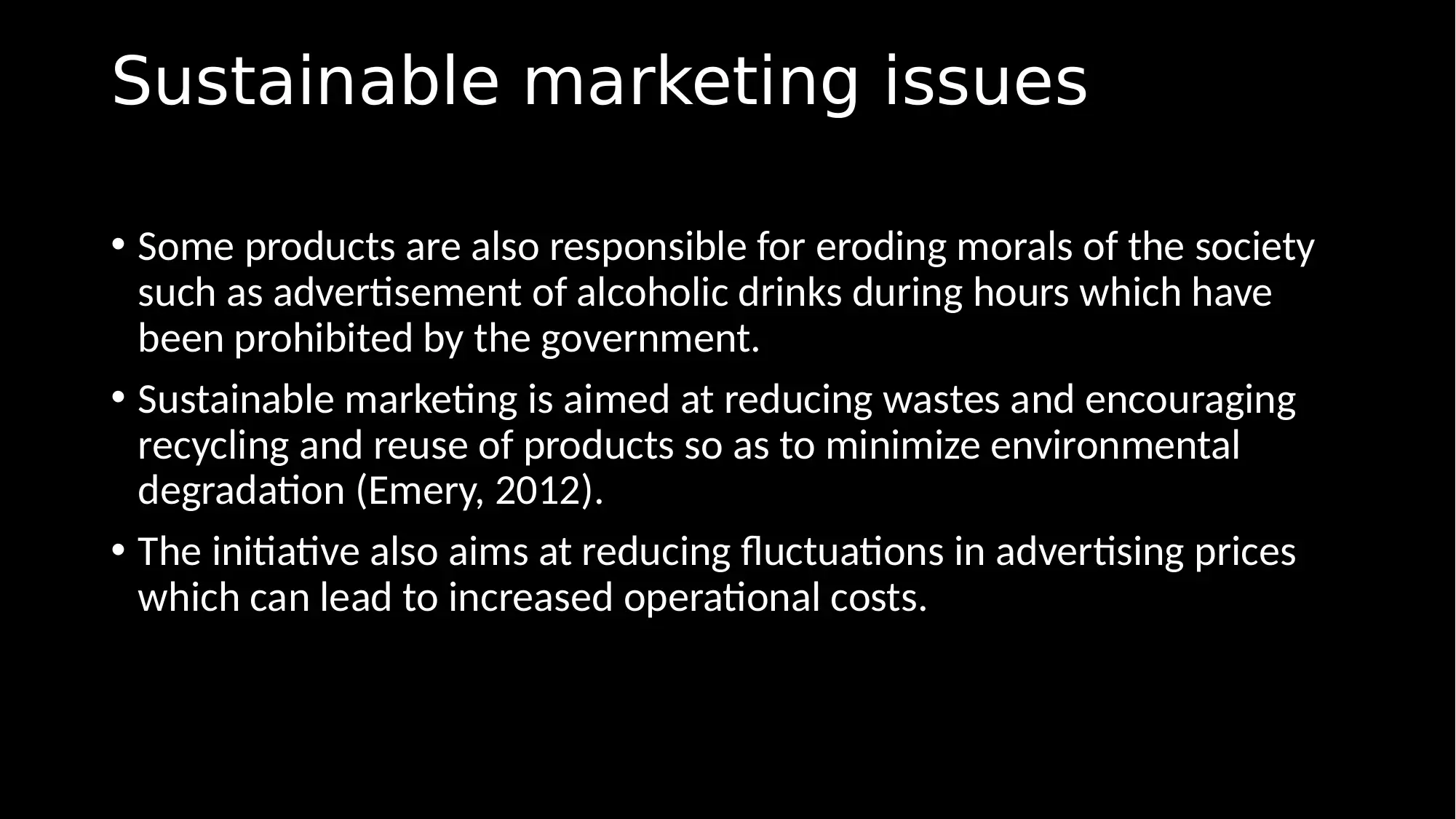
Sustainable marketing issues
• Some products are also responsible for eroding morals of the society
such as advertisement of alcoholic drinks during hours which have
been prohibited by the government.
• Sustainable marketing is aimed at reducing wastes and encouraging
recycling and reuse of products so as to minimize environmental
degradation (Emery, 2012).
• The initiative also aims at reducing fluctuations in advertising prices
which can lead to increased operational costs.
• Some products are also responsible for eroding morals of the society
such as advertisement of alcoholic drinks during hours which have
been prohibited by the government.
• Sustainable marketing is aimed at reducing wastes and encouraging
recycling and reuse of products so as to minimize environmental
degradation (Emery, 2012).
• The initiative also aims at reducing fluctuations in advertising prices
which can lead to increased operational costs.
Paraphrase This Document
Need a fresh take? Get an instant paraphrase of this document with our AI Paraphraser
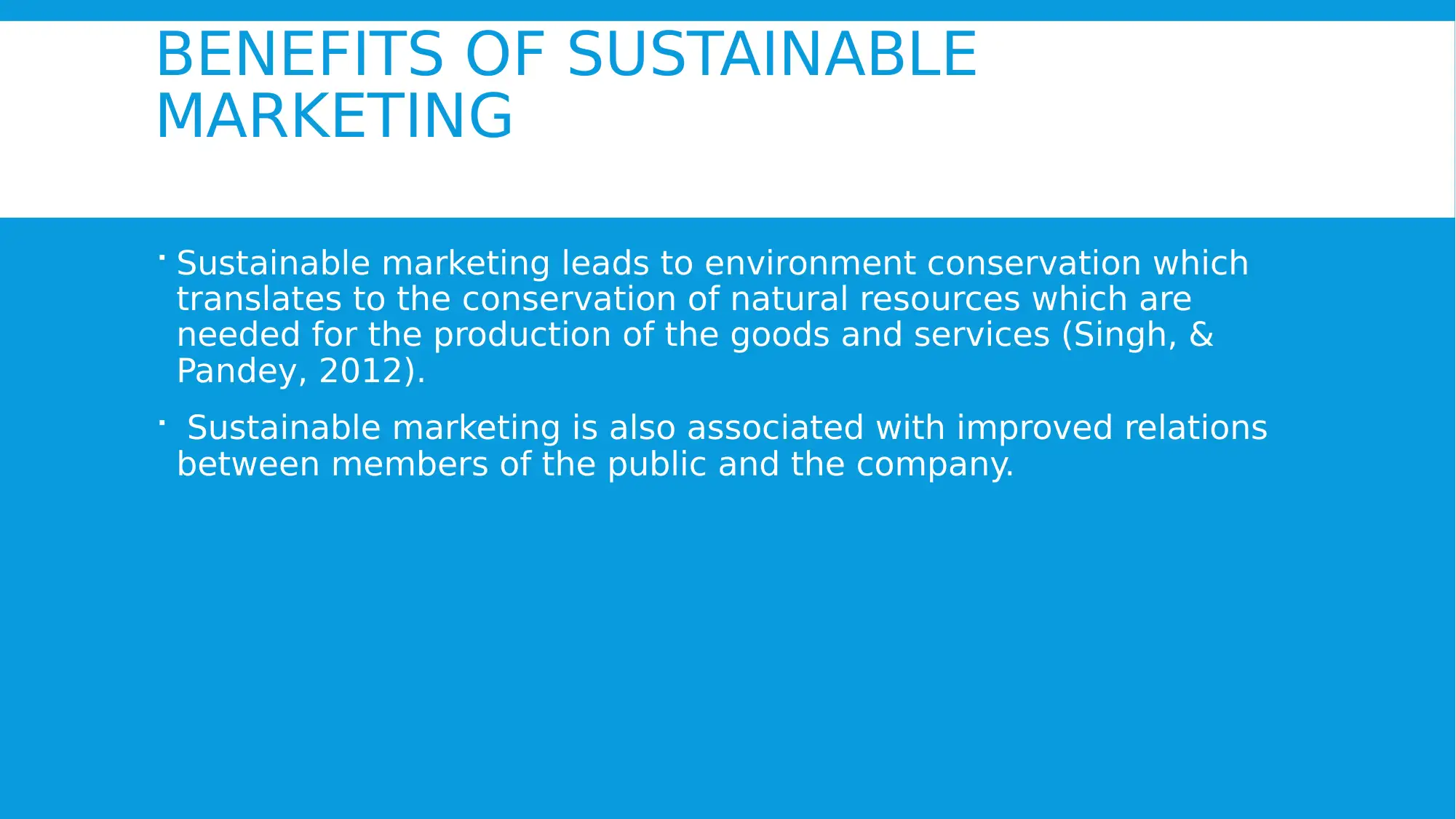
BENEFITS OF SUSTAINABLE
MARKETING
Sustainable marketing leads to environment conservation which
translates to the conservation of natural resources which are
needed for the production of the goods and services (Singh, &
Pandey, 2012).
Sustainable marketing is also associated with improved relations
between members of the public and the company.
MARKETING
Sustainable marketing leads to environment conservation which
translates to the conservation of natural resources which are
needed for the production of the goods and services (Singh, &
Pandey, 2012).
Sustainable marketing is also associated with improved relations
between members of the public and the company.
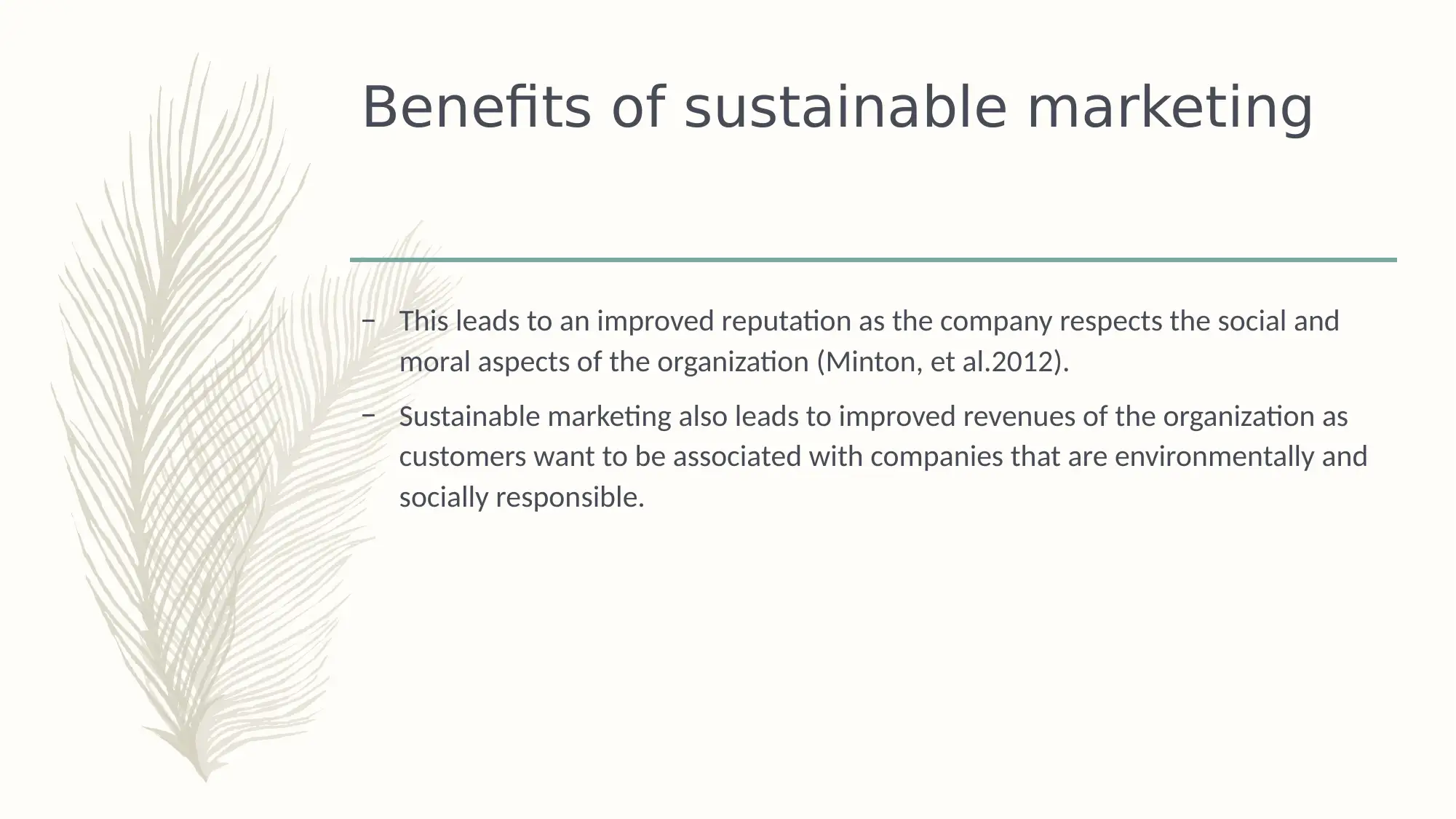
Benefits of sustainable marketing
– This leads to an improved reputation as the company respects the social and
moral aspects of the organization (Minton, et al.2012).
– Sustainable marketing also leads to improved revenues of the organization as
customers want to be associated with companies that are environmentally and
socially responsible.
– This leads to an improved reputation as the company respects the social and
moral aspects of the organization (Minton, et al.2012).
– Sustainable marketing also leads to improved revenues of the organization as
customers want to be associated with companies that are environmentally and
socially responsible.
⊘ This is a preview!⊘
Do you want full access?
Subscribe today to unlock all pages.

Trusted by 1+ million students worldwide
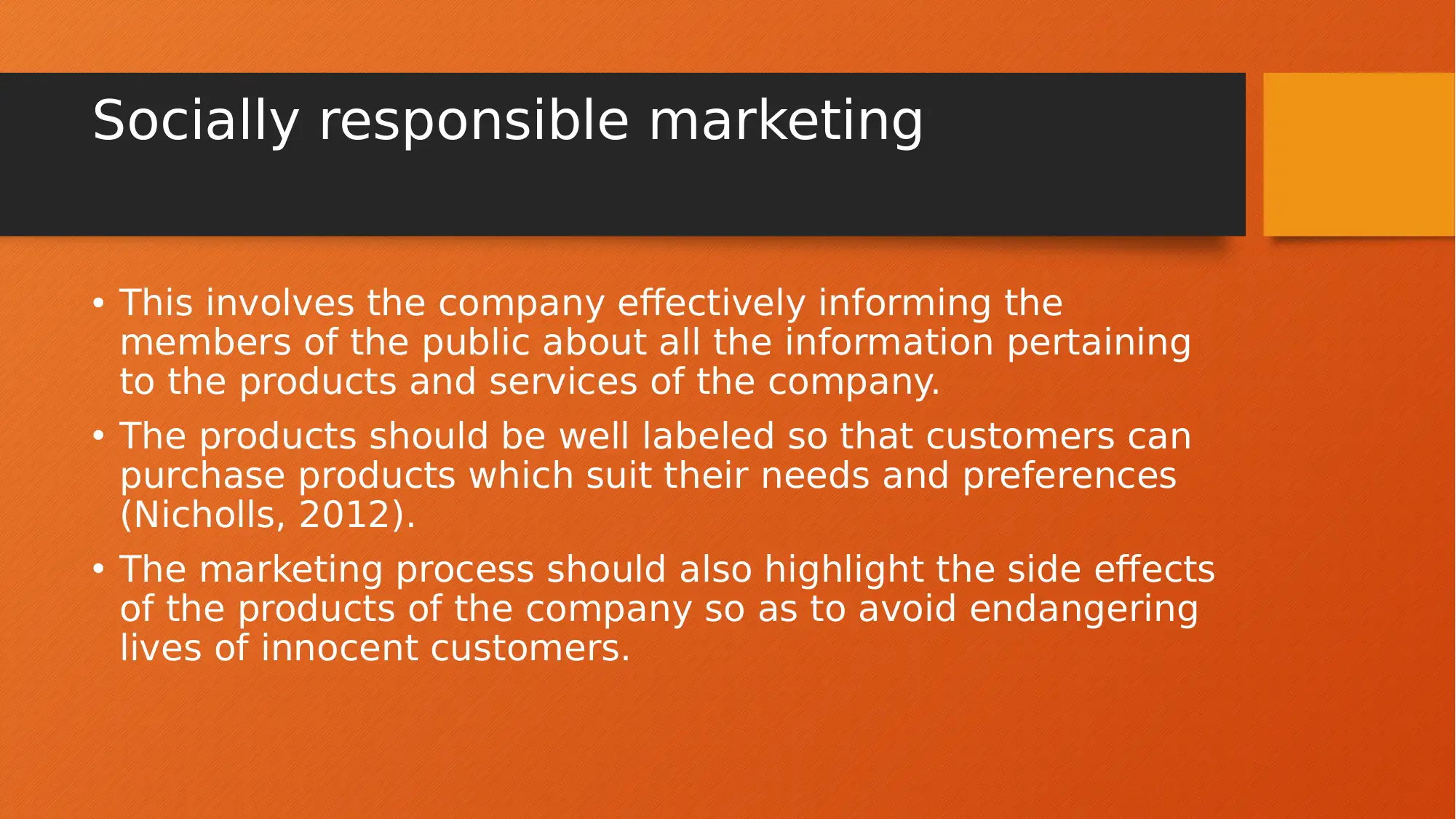
Socially responsible marketing
• This involves the company effectively informing the
members of the public about all the information pertaining
to the products and services of the company.
• The products should be well labeled so that customers can
purchase products which suit their needs and preferences
(Nicholls, 2012).
• The marketing process should also highlight the side effects
of the products of the company so as to avoid endangering
lives of innocent customers.
• This involves the company effectively informing the
members of the public about all the information pertaining
to the products and services of the company.
• The products should be well labeled so that customers can
purchase products which suit their needs and preferences
(Nicholls, 2012).
• The marketing process should also highlight the side effects
of the products of the company so as to avoid endangering
lives of innocent customers.
Paraphrase This Document
Need a fresh take? Get an instant paraphrase of this document with our AI Paraphraser
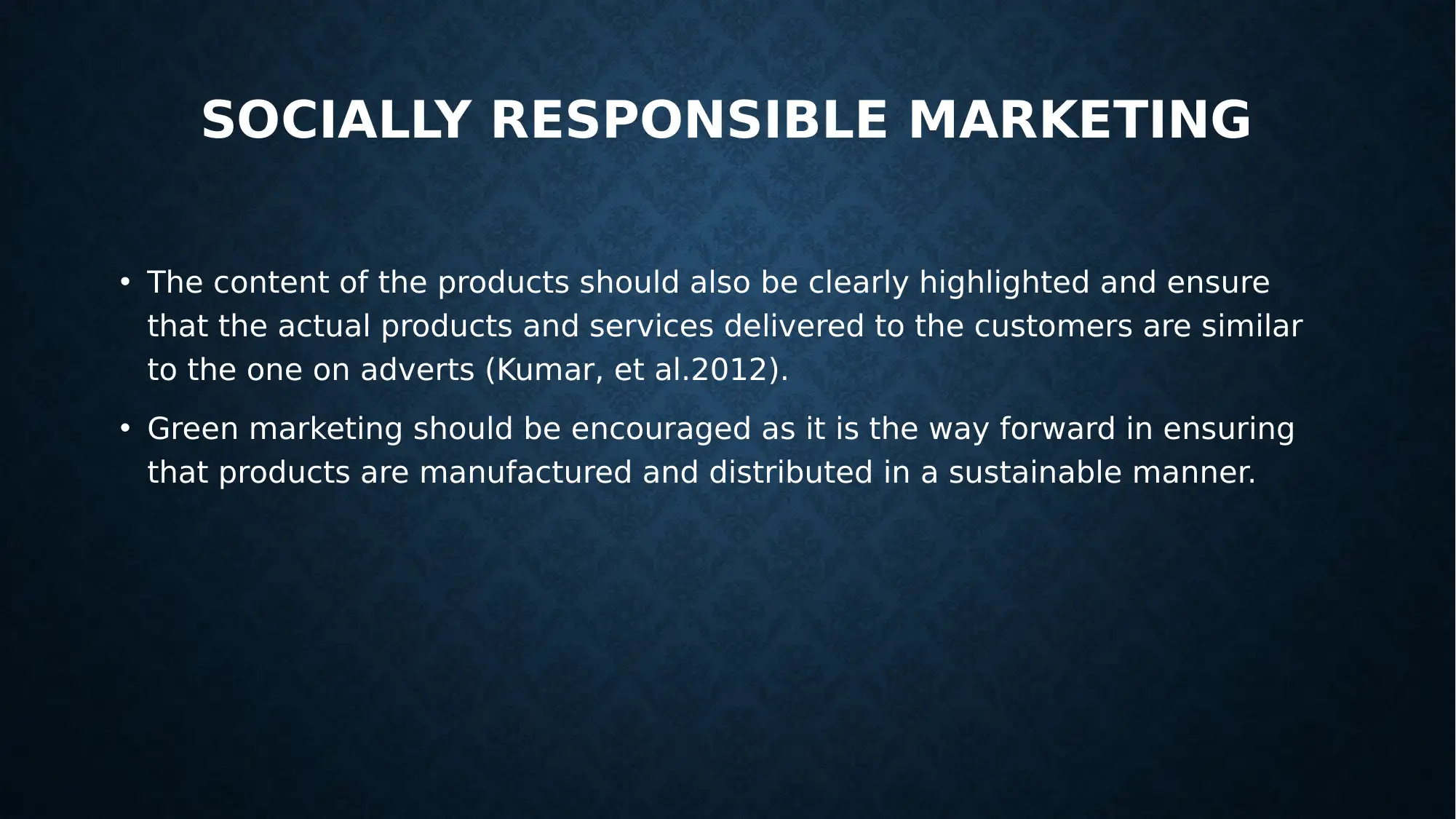
SOCIALLY RESPONSIBLE MARKETING
• The content of the products should also be clearly highlighted and ensure
that the actual products and services delivered to the customers are similar
to the one on adverts (Kumar, et al.2012).
• Green marketing should be encouraged as it is the way forward in ensuring
that products are manufactured and distributed in a sustainable manner.
• The content of the products should also be clearly highlighted and ensure
that the actual products and services delivered to the customers are similar
to the one on adverts (Kumar, et al.2012).
• Green marketing should be encouraged as it is the way forward in ensuring
that products are manufactured and distributed in a sustainable manner.
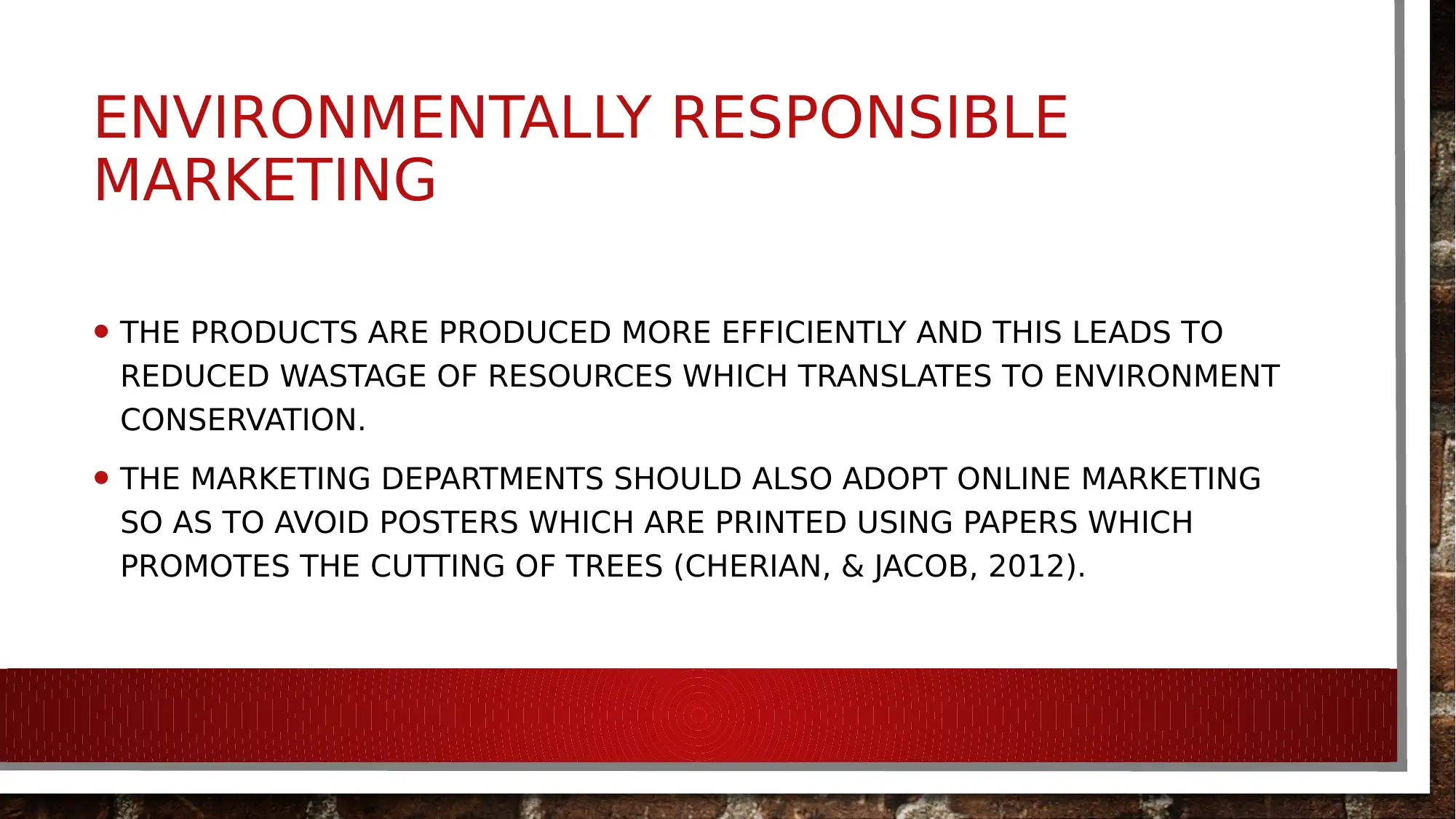
ENVIRONMENTALLY RESPONSIBLE
MARKETING
• THE PRODUCTS ARE PRODUCED MORE EFFICIENTLY AND THIS LEADS TO
REDUCED WASTAGE OF RESOURCES WHICH TRANSLATES TO ENVIRONMENT
CONSERVATION.
• THE MARKETING DEPARTMENTS SHOULD ALSO ADOPT ONLINE MARKETING
SO AS TO AVOID POSTERS WHICH ARE PRINTED USING PAPERS WHICH
PROMOTES THE CUTTING OF TREES (CHERIAN, & JACOB, 2012).
MARKETING
• THE PRODUCTS ARE PRODUCED MORE EFFICIENTLY AND THIS LEADS TO
REDUCED WASTAGE OF RESOURCES WHICH TRANSLATES TO ENVIRONMENT
CONSERVATION.
• THE MARKETING DEPARTMENTS SHOULD ALSO ADOPT ONLINE MARKETING
SO AS TO AVOID POSTERS WHICH ARE PRINTED USING PAPERS WHICH
PROMOTES THE CUTTING OF TREES (CHERIAN, & JACOB, 2012).
⊘ This is a preview!⊘
Do you want full access?
Subscribe today to unlock all pages.

Trusted by 1+ million students worldwide
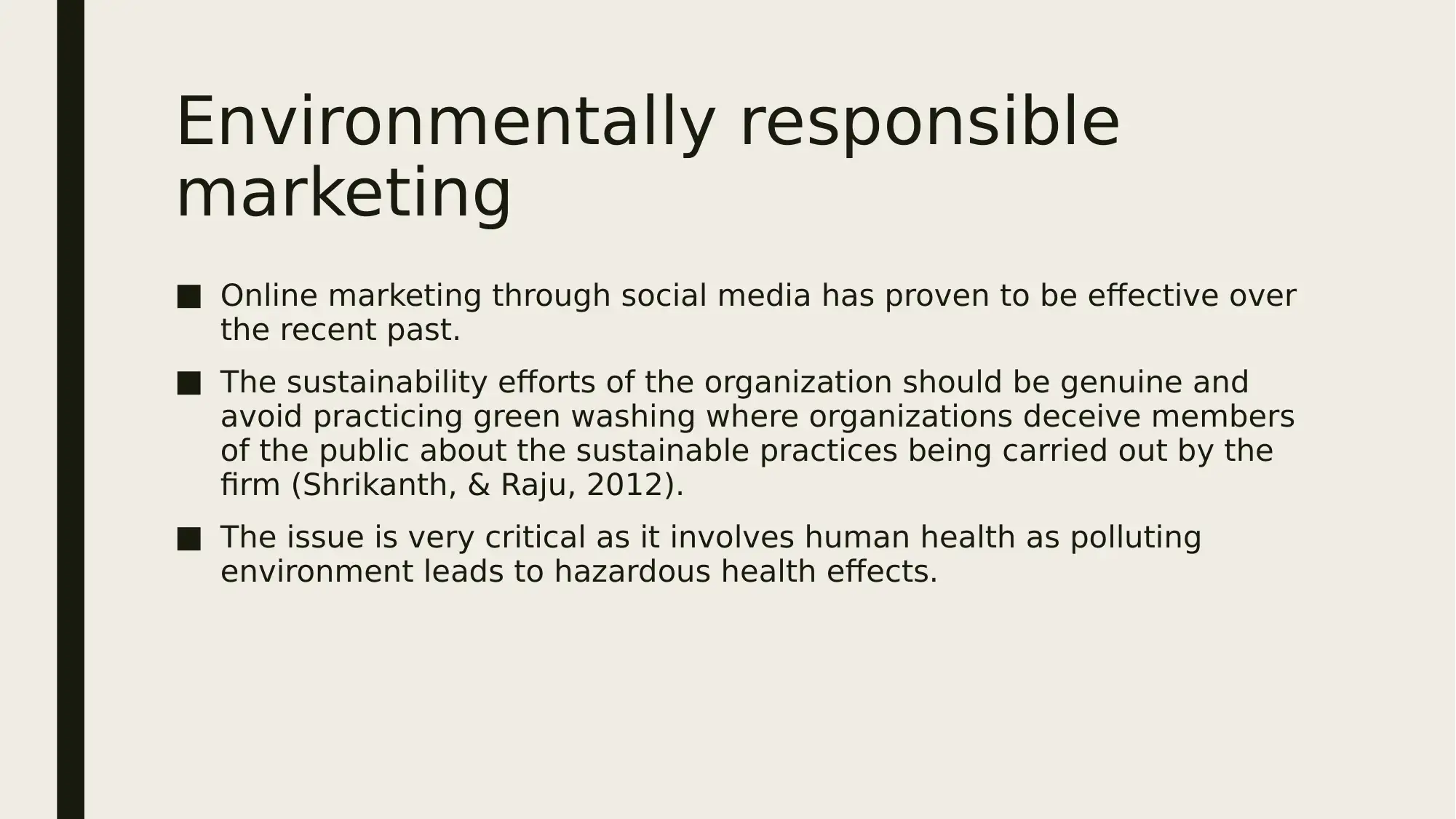
Environmentally responsible
marketing
■ Online marketing through social media has proven to be effective over
the recent past.
■ The sustainability efforts of the organization should be genuine and
avoid practicing green washing where organizations deceive members
of the public about the sustainable practices being carried out by the
firm (Shrikanth, & Raju, 2012).
■ The issue is very critical as it involves human health as polluting
environment leads to hazardous health effects.
marketing
■ Online marketing through social media has proven to be effective over
the recent past.
■ The sustainability efforts of the organization should be genuine and
avoid practicing green washing where organizations deceive members
of the public about the sustainable practices being carried out by the
firm (Shrikanth, & Raju, 2012).
■ The issue is very critical as it involves human health as polluting
environment leads to hazardous health effects.
Paraphrase This Document
Need a fresh take? Get an instant paraphrase of this document with our AI Paraphraser
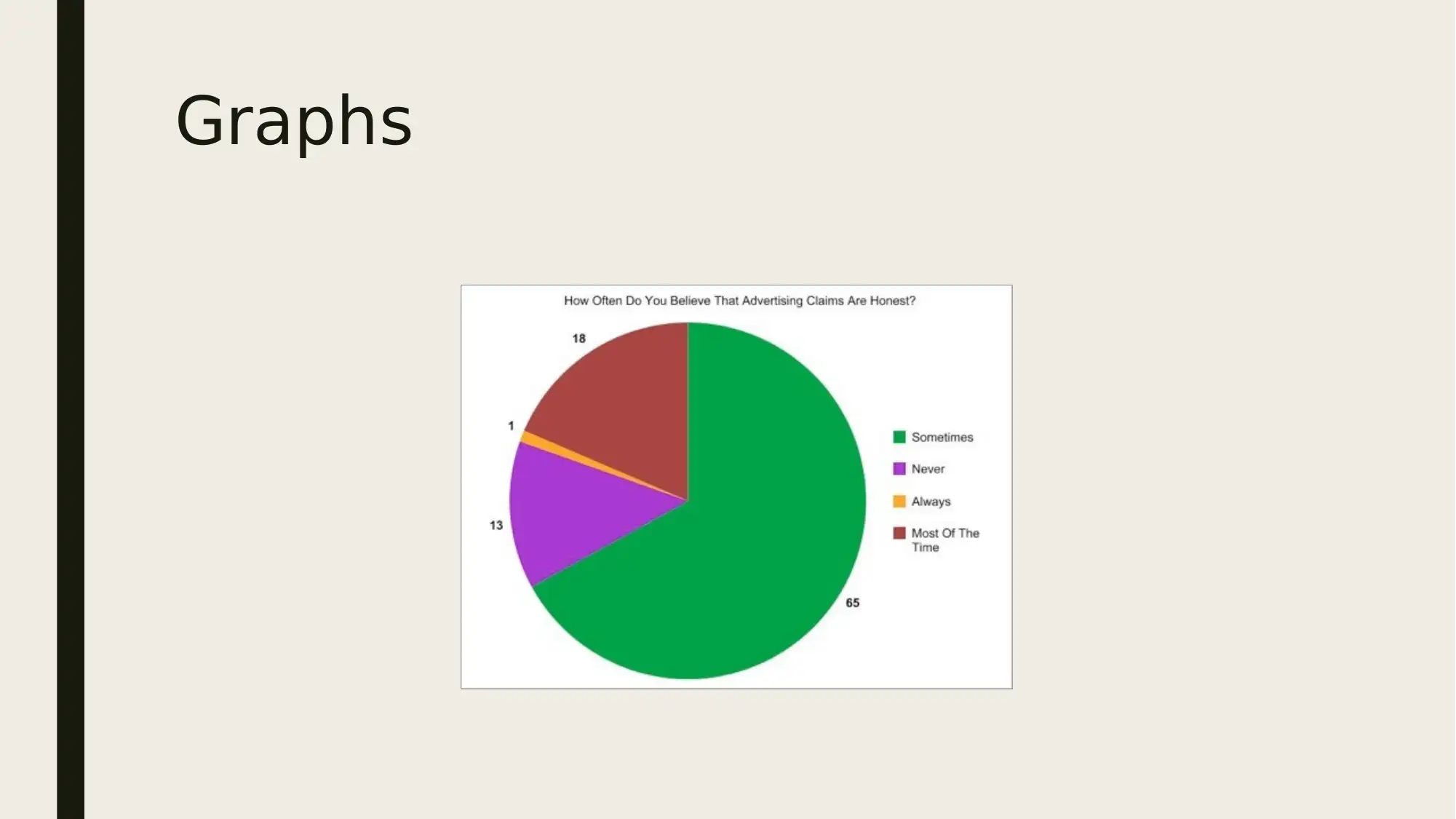
Graphs
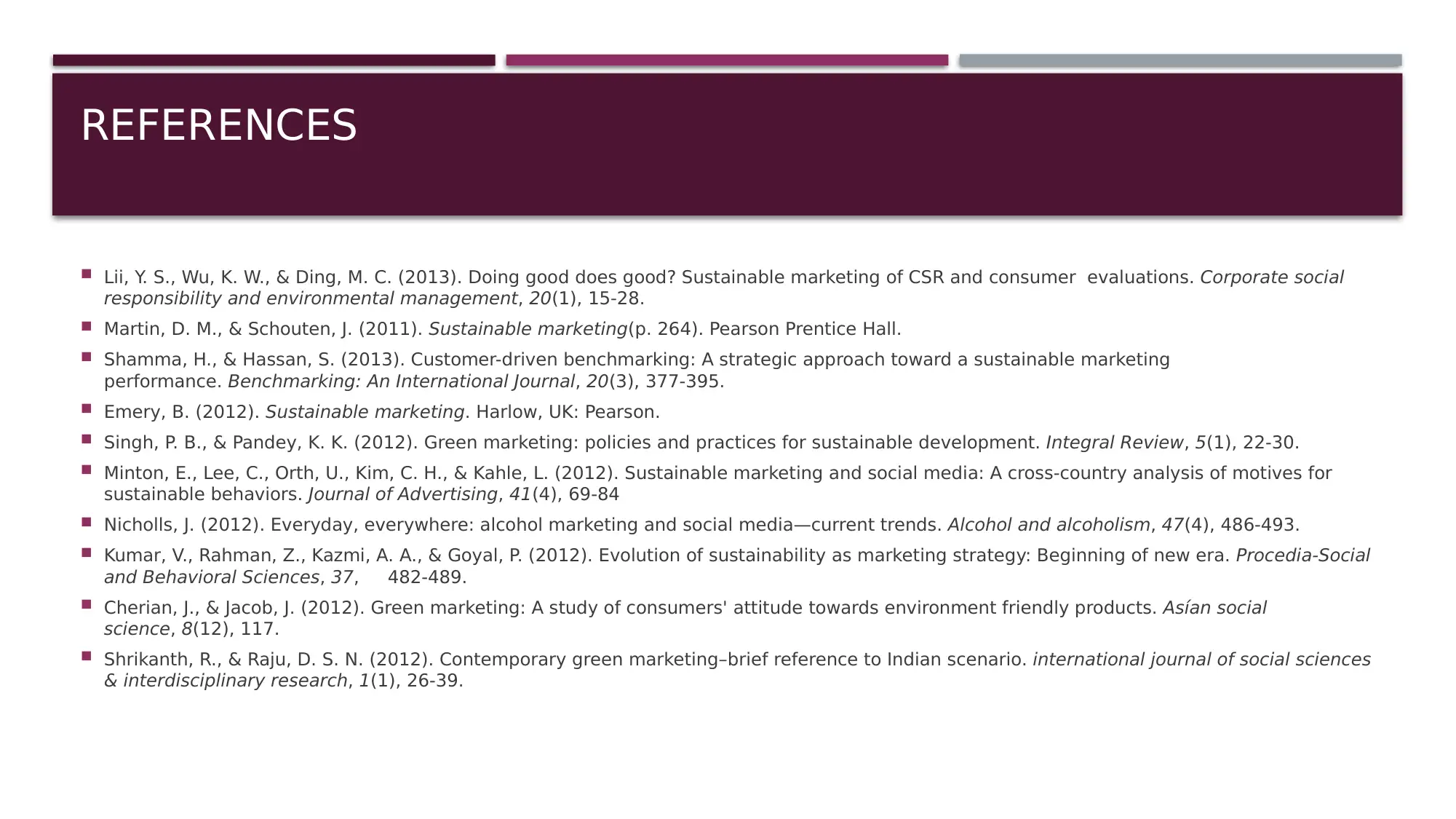
REFERENCES
Lii, Y. S., Wu, K. W., & Ding, M. C. (2013). Doing good does good? Sustainable marketing of CSR and consumer evaluations. Corporate social
responsibility and environmental management, 20(1), 15-28.
Martin, D. M., & Schouten, J. (2011). Sustainable marketing(p. 264). Pearson Prentice Hall.
Shamma, H., & Hassan, S. (2013). Customer-driven benchmarking: A strategic approach toward a sustainable marketing
performance. Benchmarking: An International Journal, 20(3), 377-395.
Emery, B. (2012). Sustainable marketing. Harlow, UK: Pearson.
Singh, P. B., & Pandey, K. K. (2012). Green marketing: policies and practices for sustainable development. Integral Review, 5(1), 22-30.
Minton, E., Lee, C., Orth, U., Kim, C. H., & Kahle, L. (2012). Sustainable marketing and social media: A cross-country analysis of motives for
sustainable behaviors. Journal of Advertising, 41(4), 69-84
Nicholls, J. (2012). Everyday, everywhere: alcohol marketing and social media—current trends. Alcohol and alcoholism, 47(4), 486-493.
Kumar, V., Rahman, Z., Kazmi, A. A., & Goyal, P. (2012). Evolution of sustainability as marketing strategy: Beginning of new era. Procedia-Social
and Behavioral Sciences, 37, 482-489.
Cherian, J., & Jacob, J. (2012). Green marketing: A study of consumers' attitude towards environment friendly products. Asían social
science, 8(12), 117.
Shrikanth, R., & Raju, D. S. N. (2012). Contemporary green marketing–brief reference to Indian scenario. international journal of social sciences
& interdisciplinary research, 1(1), 26-39.
Lii, Y. S., Wu, K. W., & Ding, M. C. (2013). Doing good does good? Sustainable marketing of CSR and consumer evaluations. Corporate social
responsibility and environmental management, 20(1), 15-28.
Martin, D. M., & Schouten, J. (2011). Sustainable marketing(p. 264). Pearson Prentice Hall.
Shamma, H., & Hassan, S. (2013). Customer-driven benchmarking: A strategic approach toward a sustainable marketing
performance. Benchmarking: An International Journal, 20(3), 377-395.
Emery, B. (2012). Sustainable marketing. Harlow, UK: Pearson.
Singh, P. B., & Pandey, K. K. (2012). Green marketing: policies and practices for sustainable development. Integral Review, 5(1), 22-30.
Minton, E., Lee, C., Orth, U., Kim, C. H., & Kahle, L. (2012). Sustainable marketing and social media: A cross-country analysis of motives for
sustainable behaviors. Journal of Advertising, 41(4), 69-84
Nicholls, J. (2012). Everyday, everywhere: alcohol marketing and social media—current trends. Alcohol and alcoholism, 47(4), 486-493.
Kumar, V., Rahman, Z., Kazmi, A. A., & Goyal, P. (2012). Evolution of sustainability as marketing strategy: Beginning of new era. Procedia-Social
and Behavioral Sciences, 37, 482-489.
Cherian, J., & Jacob, J. (2012). Green marketing: A study of consumers' attitude towards environment friendly products. Asían social
science, 8(12), 117.
Shrikanth, R., & Raju, D. S. N. (2012). Contemporary green marketing–brief reference to Indian scenario. international journal of social sciences
& interdisciplinary research, 1(1), 26-39.
⊘ This is a preview!⊘
Do you want full access?
Subscribe today to unlock all pages.

Trusted by 1+ million students worldwide
1 out of 12
Related Documents
Your All-in-One AI-Powered Toolkit for Academic Success.
+13062052269
info@desklib.com
Available 24*7 on WhatsApp / Email
![[object Object]](/_next/static/media/star-bottom.7253800d.svg)
Unlock your academic potential
Copyright © 2020–2026 A2Z Services. All Rights Reserved. Developed and managed by ZUCOL.





